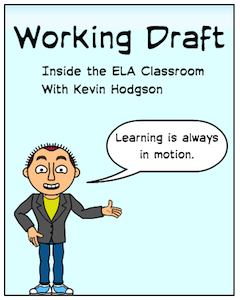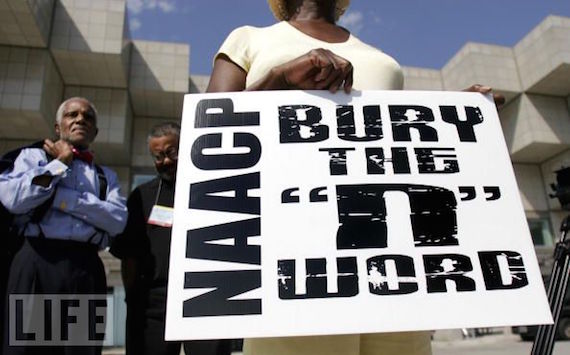When Race Enters the Classroom Conversation
A MiddleWeb Blog

We were in the midst of reading The Watsons Go to Birmingham 1963 by Christopher Paul Curtis, and our talk was centered on the Civil Rights movement — prejudice and racial tension, the role of young people in confronting prejudice, and the painful change our country has gone through from the time of “whites only” signs over drinking fountains and the bombing of churches to the election of an African American president.
I am usually adept at addressing left-field queries, and consider myself quick on my feet. But his words, when he asked his question, still took me aback.
“I’ve always wondered,” he asked, sort of slowly and purposefully, as if not sure how to tread ahead with expressing what he wanted to know. “How come black kids, and pop stars, can call each other the ‘n’ word, and how come it is used in the music we listen to all the time, but if we (white kids) use that word, it’s bad?”
The room fell silent. That’s a good indication that he only was expressing what others were likely thinking, or have thought about, but never wanted to ask out loud before. All eyes were now on me.
Word Choice and History
It was a legitimate question and, to be frank, it was one I was not quite prepared for. I was faced with a decision here as the so-called “voice of authority.” Should I spark a discussion about the historical legacy of the “n” word, and grapple with how to do that without using the word itself, or deftly put the question aside.
I glanced over at the only African American student in the classroom, wondering what he was thinking about the question. I felt both protective and cautious, not wanting to feed into stereotypes of race nor contribute to the possible feeling of isolation of this student by pursuing an open conversation.
I didn’t skirt the issue, but I am not sure I did it justice, either. I launched into a mini-lesson about race and prejudice in our country, connecting his question back to the novel we were reading and previous lessons about the Civil War and slavery. I talked about pop culture’s ability to take a word, even one with negative connotations, and turn it around, altering the way words are used. I talked about power, and I talked about language.
I sounded like a teacher on a podium. I lectured. They listened. I did not really open it up to too many questions. And I don’t think I did justice to the question because the question unsettled me, with my own cultural bias as a white middle-aged, middle class man. Talk about privilege.
Beyond My Classroom
It became one of those moments that has been sitting uncomfortably in the back of my mind for a few weeks now. So imagine my surprise recently when a team of talented teachers at an urban STEM middle school I have been working with all year (as a writing facilitator with the Western Massachusetts Writing Project) decided to do a classroom inquiry project that involved the “n” word, using the Socratic Seminar approach. Their aim? To help eighth graders parse through how the word is used in pop culture (their mentor text here was To Kill a Mockingbird).
Jamilla Jones, one of the teachers, shared a handful of intriguing resources with me, including a powerful story and interactive video from The Washington Post, and video interviews with Oprah Winfrey, Kanye West and others.
As I listened to these teachers explain how they introduced this intense classroom discussion model to explore a difficult and emotional topic, with a mixed race class — and how the researching and writing and talking helped students find their way to a better understanding of how language is used and changes over time — I realized this was a framework I need to explore more.
In digging around, I also found this race-themed Five Minute Film Festival from Edutopia, which provides even more resources for discussions.
I’m still not sure if sixth grade is too young for these kinds of intense discussions about race and about charged words that are weighted with historical context. I’m also unsure if the composition of my school community (overwhelmingly white) will provide the multiple perspectives that are needed to provide a honest, balanced conversation. But I feel a bit more prepared now in how to address this issue when it comes up again in the future, as it surely will.
I may have come up short this year when the teaching moment appeared, at least in my mind, but I am hopeful I have educated myself enough to be ready next time.


































Thank you! A very honest piece that will be helpful to many teachers.
Thank you. I did struggle with how to write this one. There are so many layers to this kind of discussion, including the age of the student.
Such honesty in this, Kevin! Those moments when we, as teachers, struggle to do what’s best for the students, and feel that we fall short…those stay with me too. I admire your reflection and eagerness to take this moment and grow from it. Sharing it helped so many others grow too!
We have to reflect more (or I have to reflect more) on what we do and don’t do, so that we can make a path forward. Thanks for taking the time to leave a note.
Kevin
This is a big question and your willingness to open it up for discussion speaks volumes about your classroom community. I love the idea of a Socratic Seminar to explore it, not sure I could pull that off with 5th graders though.
I struggle with how best to think about using it, too, but I am inspired by my teacher-friend and her work. It might be that parts of it work for sparking discussions at the younger end of middle school.
Kevin
The clue here is that the STUDENT raised the question. If they’re old enough to express their curiosity about it, they’re old enough for you to explore the topic with them. Take cues from them, if they don’t approach it then it probably is too soon
That is good advice. What is challenging is to be ready for it.
Kevin
Great post, Kevin, I’ve been thinking about this issue, too:
https://ateachinglifedotcom.wordpress.com/2015/05/14/middle-school-life-race-and-classroom-conversation/
Thanks, Tara. I am going to your post now to take a look.
Thank you for this. Something my school has made a focus this year (and for the years ahead). Tricky to figure out what and how to have conversations with younger kids. While we have a more diverse student body, the white kids are still very much the majority so we are always trying to sort out stereotype threat. (We’ve been working with an excellent consultant — Glenn Singleton.) Thanks again.
That fact that your school has made it a focus says a lot about how important it is to deal with it.
Thanks
Kevin
Conversations like this are difficult but essential. I feel your pain. Navigating race in a mixed classroom requires that delicate balance you were striving for. I too have reverted to lecturing in hopes of protecting a singular student. What’s important is that we recognize that this is not enough and keep trying for authenticity. They deserve nothing less.
I agree, Judy, and reflective practice helps us all move forward.
Thanks for sharing
Kevin
Kevin, I loved this post. Your student who posed that question is fortunate to have you as a teacher – you didn’t shut him down, nor brush the question aside. The other students are fortunate, because you are willing to open up this taboo topic. We are fortunate, because you allowed us a window into a vulnerable situation you experienced!
Just today, I heard that the Smithsonian is soon to open a National Museum of African American History and Culture (http://nmaahc.si.edu/). I don’t know what resources they have available (haven’t had time to dig into their site), but hopefully they will have materials to help all of us answer these kinds of questions with more honesty and openness, and less awkwardness.